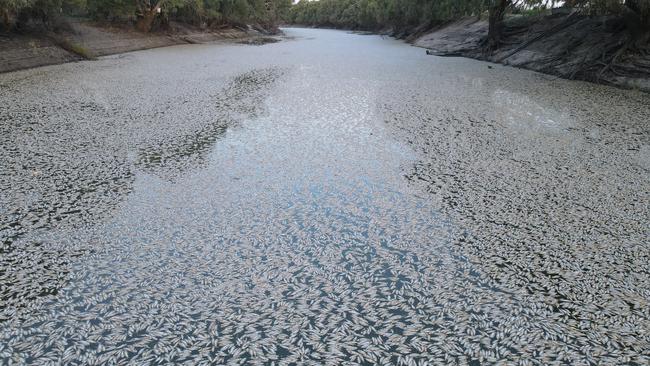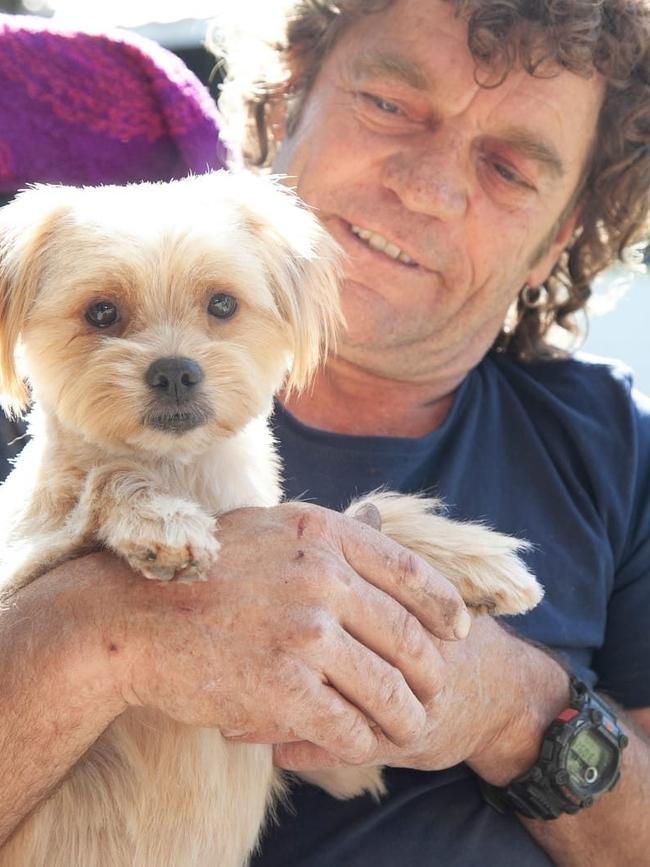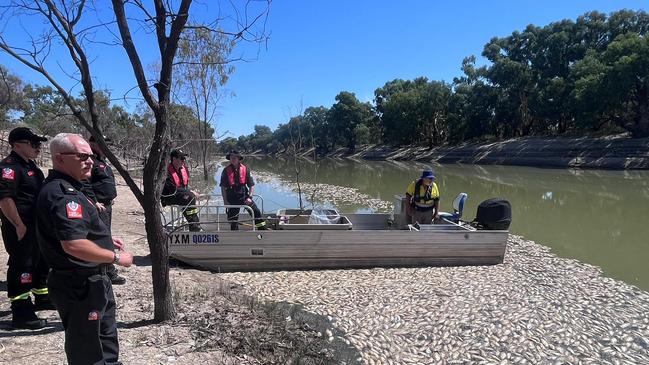Menindee locals blame water mismanagement for dead fish in Darling-Baaka River
Menindee resident Tom Murkins has lived all his life on the banks of the Darling-Baaka River. Now, when he steps out and looks at his precious river, all he sees is death.
NSW
Don't miss out on the headlines from NSW. Followed categories will be added to My News.
Menindee resident Tom Murkins was born on the banks of the Darling-Baaka River. He spent his entire life relying on the flowing water, the lifeblood of his town.
Now, when he steps out and looks at his precious river, all he sees is death.
The tiny town of 500 is in crisis. Millions upon millions of pungent, decomposing fish clog the river stream like fat in an artery.
Locals say it‘s only a matter of time before the town has a heart attack.
“The river is dead. It’s a dead, stinking mess. Nobody will listen to us. Get somebody here and do something. The river is just choked up with dead fish,” said Mr Murkins.
Officials say the mass killing — predominantly made up of a native fish called bony herring, as well as smaller numbers of native species such as Murray cod, golden perch and silver perch, plus feral carp — was caused by low oxygen levels in the water, triggered by recent floods and heatwaves.
However, most locals fiercely reject this. They say the blanket of rotting fish results from years of government mismanagement of competing demands for use of the water — and now they are feeling the pain.

“This Murray Darling Basin Plan isn’t working … We always had good-quality water, and I’d never seen a fish die in my lifetime until now,” Mr Murkins said.
“Some of these fish are older than me. They have lived through droughts and flood, and now mismanagement is killing them.”
Like hundreds of others, Mr Murkins depends on the river.
The town of Menindee — around an hour from Broken Hill — uses the river as its primary water source.
The local water treatment plant draws directly from the river system. However, whether locals have access to this treated water, depends on where they live.
Those who live on the river’s edge, like Mr Murkins, draw untreated water directly from the river using personal pumps. They rely on this water for washing, bathing and other domestic uses and use rainwater for drinking.

Mr Murkins fondly remembers when the river water was clean, teeming with life.
“Nearly half of the town is unconnected from the main (treated) water grid,” he said.
“We choose to live like this … It used to be the norm, and we never used to have any problems.
“You could go and jump in the river, you could do whatever you liked with it, there was never anything wrong with it.”
Now, he says, the water is toxic.
An emergency hub was set up in response to the mass killing, with police co-ordinating with the NSW Department of Planning and Environment, NSW Department of Primary Industries, Water NSW and Central Darling Shire Council to ensure residents have clean and fresh water, as well as working to dispose of the dead fish.
While authorities have reassured residents that the water supply is “safe and secure” for showering and washing, the overpowering stench of decomposing fish has locals questioning the water quality.
“The water stinks and with these dead fish in it. No matter what detergent you use, you‘re not going to kill all those germs,” said Mr Murkins.
Unable to use the river, he has resorted to using his rain-tank water — his primary source of drinking water — for everyday use. He says it‘s only a matter of time until he runs dry.
NSW Police Force Regional Emergency Operations Controller Assistant Commissioner Brett Greentree, who is leading the emergency response, swears there’s no need for concern about the water supply.
“The results of current testing … have confirmed the quality of the water has not been impacted, and it’s safe for customers to drink,” he said.
“There are multiple viable solutions to maintain water supply, and increased monitoring, and testing will ensure the changeover is immediate if alternative supply is required.”

The Central Darling Shire Council has agreed to supply free water to those whose properties ordinarily rely on the river for water supply. Still, residents are nervous.
In an emergency town meeting, enraged residents demanded officials drink a glass of the water, claiming that even the treated water still smelled of dead fish.
Mr Murkins said for water that had been filtered, it still smells and “people that don‘t have rainwater tanks have got to buy bottled water, which is dearer than petrol out here”.
In 2018 and 2019 the region experienced similar mass fish deaths, though the latest eclipses anything seen before.
Resident Graeme McCrabb has become a spokesman for the town and, like many locals, firmly believes the problem could have been avoided.
“There’s very little answers and certainly no acceptance of blame … We need better water policy, we can’t bring those fish back, but if we continue down with the same policies, we are going to end up in the same boat,” he said.
“We have just had the third-biggest flood in Menindee‘s history, yet we are having to truck water into communities on the river.
“It just goes to show what a poor state the river is actually in.
“We are just tired of it. Everyone‘s tired of it.”

Barkandji woman Barb Quayle says for every fish death, local traditional owners lose a part of their culture.
“The river is the lifeblood of our people and everybody that lives on that river.” she said.
“The bony bream are a totem of our Barkandji people. We are hurting double. We are losing fish from the system, but we are also losing totems.”
Ms Quayle said she was desperate for authorities to listen to the community.
“Experts’ will come out, they’ll sit in front of a room, and they’ll speak, but they don’t listen,” she said.
“They need to listen to our elders. They‘re the people that have lived a lifetime on the river … They need to listen to what it used to be like.
“It’s not until they started tampering with the natural system that this stuff started happening.”
Independent MP for Murray Helen Dalton is calling for an “urgent, special commission of inquiry into water quality and mismanagement”.
“We have fish kills in drought and now we have fish kills in flood, what the hell is happening to our water quality and the way we are manage our rivers,” she asked.
“While the department keeps blaming low oxygen levels made worse by receding flood waters, we have to look at why this is happening more and more, and that includes looking at the basin plan.”
A contractor is now on the water, working with Fire and Rescue NSW to remove the decaying fish. It will take a long time, and in the meantime locals keep holding their noses.
Got a news tip? Email emily.kowal@news.com.au



